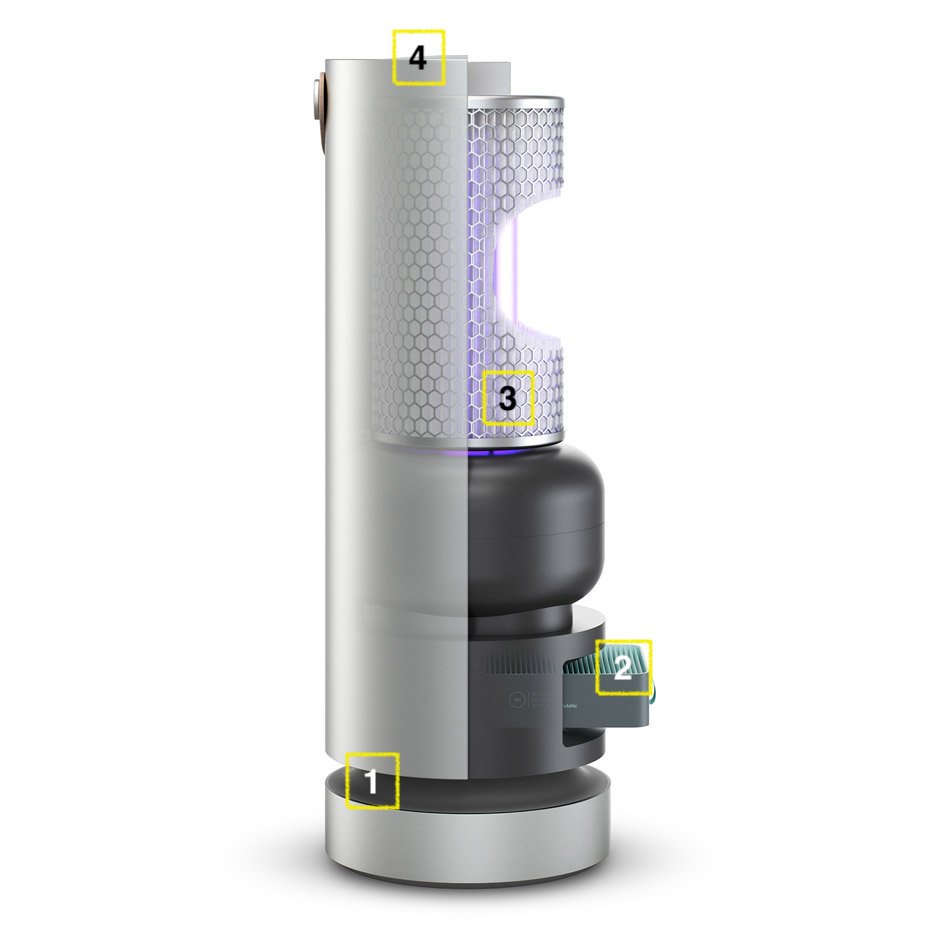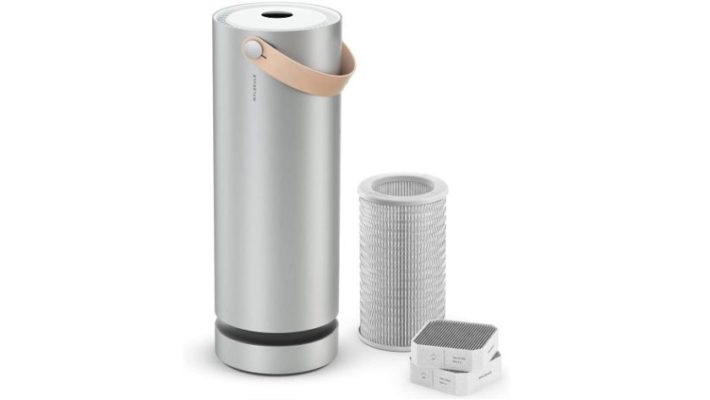Molekule is designed to completely clean the air in a large, 600-square-foot room once every hour. It is powered by two filters: a pre-filter, which captures dust and other larger particles, and a “photoelectrochemical oxidation (PECO) filter,” coated with a proprietary catalyst that breaks down bacteria, viruses and other pollutants and, according to the company, can destroy pollutants 1,000 times smaller than a HEPA filter can. In one peer-reviewed study, researchers found that when those who suffered from allergies used the Molekule, there were “significant and sustained improvements within a week of using a portable air filtration system using PECO technology.” Find details in Molekule air purifier review.
This sleek aluminum, canister-style gadget, which has a handle for easy carrying from room to room, can be controlled with a touchscreen display. As for the filters, Molekule offers automatic refills for $65 a pack. The packs include one PECO filter, which needs to be replaced every six months, and two pre-filters, which need to be replaced every three months.

How does Molekule air purifier work?
- Step 1 – 360 DEGREE AIR INTAKE: Molekule takes in air from every angle
- Step 2 – AIR CIRCULATES THROUGH PRE-FILTER: larger allergens like dust and dander are captured, and smaller pollutants like VOCs are slowed down while passing through the filter
- Step 3 – PECO FILTER: light activates the nanoparticle-coated filter, creating a chemical reaction that breaks down pollutants at the molecular level
- Step 4 – PURE AIR: Molekule releases harmless molecules that are meant to be in the air, reducing the presence of pollutants
| Molekule PECO | HEPA & Carbon: made to only collect. Carbon absorbs chemicals but can’t destroy. | |
|---|---|---|
| Destroys viruses | ✓ | Collects |
| Destroys allergens | ✓ | Collects |
| Destroys mold | ✓ | Collects |
| Destroys bacteria | ✓ | Collects |
| Destroys chemicals | ✓ | Collects |
| Destroys ozone | ✓ | Collects |
| Collects particles | ✓ | ✓ |
Molekule air purifier comparison
| Air | Air Mini | Air Mini+ | |
|---|---|---|---|
| Room size | 600 sq. ft. | 250 sq. ft. | 250 sq. ft. |
| Filters | 2 Filters: 1 PECO & 1 Pre-filter | 1 Filter: Integrated PECO & Pre-filter | 1 Filter: Integrated PECO & Pre-filter |
| Fan speeds | 3 | 5 Manual speeds | Auto Protect – 5 Manual speeds |
| Controls | Digital touch display & App | Touch display & App | Touch display & App |
| Body material | Anodized aluminum | Medical grade polycarbonate | Medical grade polycarbonate |
| Handle material | Premium leather | Natural felt | Vegan leather |
What is good in Molekule air purifier?
Molekule Technology
This air purifier has a pre-filter to trap debris like pet hair, clumps of dust and other large items. Then, the main filters handles smaller particles. So far, that sounds like most air purifiers. But Molekule is different.
This image shows the air cleaner with the cover off.

1. Motor: The motor isn’t shown in the photo, but it is housed in the black, round section above filter #1. It pulls air up and in through the Intake.
2. Pre-filter: The air is drawn through the pre-filter, which is pulled out a bit to show its design. It is a thick media filter similar to a vehicle’s air filter or a thick furnace filter.
It could be called “HEPA-type,” meaning it looks and acts like a True HEPA, but doesn’t reach the 99.97% filtration rate required to be labeled True HEPA. Many air purifiers, the cheaper ones from Holmes for example, use a filter like this as their main filter, not a pre-filter.
As the photo below shows, the Molekule pre-filter does a good job collecting dust and similar debris. The left side shows a new filter; the right shows a filter that should be changed.
3. Molekule main filter: This is where PECO, or photo electrochemical oxidation, takes place.
The filter uses proprietary technology that isn’t fully explained in any of the company’s literature or videos. Molekule does state, “A chemical reaction occurs when a nanoparticle-coated filter is activated by light, breaking down harmful pollutants to their most basic molecular components.”
The blue light at the top of the Molekule is the light that activates the process of photo electrochemical oxidation.
The filter has been independently tested by several certified testing agencies. The results show that it is effective in:
- Destroying mold spores and similar allergens including pollen
- Breaking down VOCs into harmless molecules like carbon dioxide, water and trace elements
4. Air discharge: The air coming out of the Molekule has been purified. Dangerous compounds have been broken into “harmless molecules that are meant to be in the air.” They’re no longer harmful pollutants.
Molekule Air Purifier performance review
In this section, we approach the Molekule the same way we reviewed other leading brands like Dyson, Honeywell, Levoit and Holmes.
Models and Room Size Rating: There is only one model currently, but Molekule reports that its scientists are constantly looking to improve the filters and the general technology.
The Molekule is designed for large rooms. The air cleaner can purify air in 600 square feet of space in one hour. Large air purifiers from Dyson, Honeywell and Winix can clean the same amount of air multiple times in an hour – the question, of course, is does it clean it as thoroughly?
Filtration: HEPA-type pre-filter and the PECO photo electrochemical oxidation filter.
Features: WiFi and App. 3 speeds – Auto (42dB), Hushed (30dB) and Boost (55dB).
Pros: The PECO filter breaks down VOCs, mold spores and other allergens into harmless, common substances.
The unit is easy to maintain. Molekule suggests replacing the main filter every 6 months and the pre-filter every 3 months. To make it easy, Molekule sells a pack with one main and two pre-filters.
Cons: Cost is a concern for some. The current price is $799. Plus, the current cost of a replacement filter set is $65. If you change the filters per Molekule’s recommendation, you’ll new two sets per year for a total of $130. That’s higher than you’ll pay for a year’s worth of pre-filters and main HEPA filters for most True HEPA air purifiers.
One size fits all rather than offering various sizes for small, medium and large spaces.
The light is bright – but it can be turned off at night – “Dark mode.” However, because it is the light that activates the filter, you won’t get PECO benefits in dark mode. Just the pre-filter will be working.
18 pounds is a little heavy, but the unit has a handy and sturdy strap.
Rating the Molekule Air Purifier
Here are ratings we apply to the other brand air purifiers we review. So far, users have given Molekule 4 out of 5 stars on the company website.
Features Rating: 4 – Three levels of activity allow for custom air cleaning. You can control the unit from the top panel or with the App. However, users that have issues with the Molekule say connectivity is a problem. Molekule continues to release firmware updates in an effort to repair connectivity and general App issues.
Filter Rating: 5 – We’re sold on PECO filtration. The independent science and testing shows that it works. Is it the best air purifier for you? See our Recommendation at the end of the review.
Efficiency Rating: 4 – Not Energy Star certified.
Quality Rating: 4 – The quality seems excellent, but the warranty is just 2 years, and that lowers our rating. Many less costly air purifiers have longer warranties. See our Honeywell Reviews and Guide for many examples.
Overall Rating: 4.5 out of 5
What is the best alternate?
The primary difference is that other brands rely on high-efficiency True HEPA filtration plus a carbon filter to capture particles rather than break them down into more basic, and harmless, molecules.
Dyson: Even Dyson, with some units priced comparably to the Molekule, relies on HEPA, carbon and a large-particle pre-filter.
Honeywell, Levoit and Holmes: These are HEPA and HEPA-type air purifiers that cost far less than Molekule. Honeywell and Levoit have a few highly effective models that we give high marks. Holmes is mostly an entry-level brand, though a few models use True HEPA filters. The brand offers good value in HEPA air purifiers. If your allergies or asthma isn’t severe, and you don’t have other health or environmental reasons for advanced air filtration, Honeywell, Levoit and Holmes have good options for general air cleaning.
Winix: As noted above, Winix uses hydroxyls to change the chemical makeup of pollutants to render them harmless. The downside is that Winix PlasmaWave technology releases a small amount of ozone. There are two advantages to a Winix. First, the cost of most units is about 1/3 the price of a Molekule. Secondly, the PlasmaWave can be turned off, and you still get excellent HEPA and carbon filtering of your air. Turn off the ECCO technology, i.e., put the unit on dark mode, and you lose the main source of filtration. Only the HEPA-type pre-filter will be doing its job.
Several of the Holmes air purifiers have ionizers that can be turned on or off. Most of them use a HEPA-type filter, not a True HEPA. We do not recommend ionizers, so all you have left on those units is the HEPA-type filter that doesn’t do a great job. Those Holmes air purifiers aren’t even worth considering.
Editor’s recommendations
- Bulex HEPA air purifier filter review – is it worth buying?
- Honeywell HPA710WE premium air purifier review
- Renpho air purifier review – is it good for allergies and pets?
- Renpho air purifier review – is it good for allergies and pets?
- Can Alen BreatheSmart Flex air purifier for large rooms remove pet odors?
